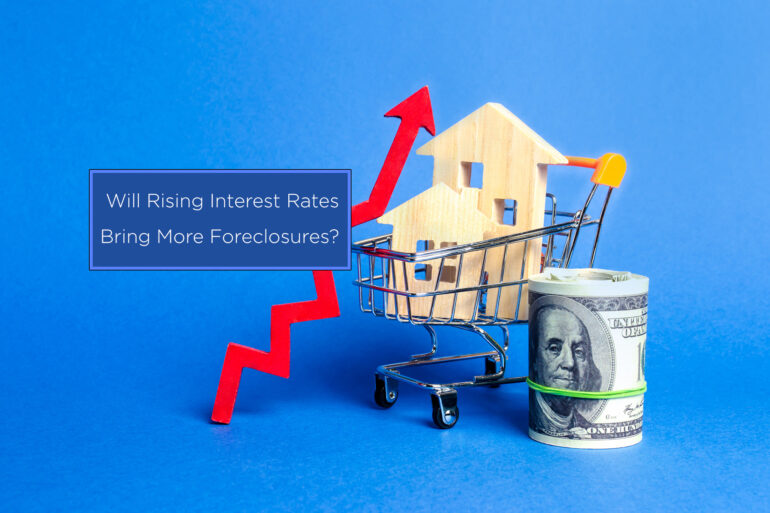Will Rising Interest Rates Bring More Foreclosures in 2023?
You all know me by now, the investor with the crystal ball! A current hot topic is rising inflation, which brings with it rising interest rates. In an effort to rein in raging inflation, the Fed hiked interest rates in early May. This move had been well anticipated by the mortgage market and, of course, investors.
Mortgage rates rose to 5.38% after June’s rate hike and peaked nearly at 6% by July and it bounced around after from a recent Bankrate survey of lenders. This survey was completed just after the Fed’s announcement that it was raising rates half a point.
I don’t sit here and tell you I am an expert on inflation, but I do have many years of experience of being a “savvy investor.” I like to examine the wider “fallout” that interest rates can bring, and one could be more foreclosures nationwide coming to the real estate market.
Average Mortgage Payments Are Increasing
The interest rate hike is the second this year. It’s argued that it is designed to cool an economy that has been red hot since rebounding from the height of COVID-19 in 2020. The dramatic recovery has included a crazy overinflated housing market characterized by record-high real estate prices and very low inventory.
Mortgage payments are averaging out at $664 more expensive than a year ago — that’s an increase of almost 40%, yikes! That’s not considering other inflationary costs that the average Joe has to find to keep themselves afloat financially. Rising mortgage rates and higher home prices are pushing monthly payments to increase at the fastest rate ever, according to real estate firm Redfin.
Redfin data released at the end of April 2022 found that a monthly mortgage payment on a home of $404,950 was $2,349. That is based on the average rate of 5.1% on a 30-year fixed-rate mortgage. Only a year ago rates were just shy of 3% and the median home asking price was 16% cheaper, so the payment was only $1,685. This is the biggest ever spike in Redfin’s data back to 2015.
Daryl Fairweather, Redfin’s chief economist, states, “Rising mortgage rates are taking a bite out of pending sales as both buyers and sellers take a step back from the turbulent market.”
She adds, “while the market on the whole is still extremely competitive (thanks in part to a severe and persistent shortage of inventory), it’s still in the ‘early days’ when it comes to the new world of mortgage rates of 5% or higher. The number of buyers willing to pay such high mortgage payments could evaporate by late summer.”
Housing prices are not just driven by interest rates but by a myriad of complex factors, so even crystal balling it still makes it tough to predict exactly how the Fed’s direction will affect the housing market long term. In the short term, higher interest rates can be very challenging for both homebuyers, who may have to cope with higher monthly payments, and sellers, who could now experience less demand for their homes.
Greg McBride, Bankrate’s chief financial analyst, says, “While rapidly rising mortgage rates may temper the demand somewhat, don’t expect home price appreciation to come to a halt. A more modest pace of appreciation is a likelier outcome.”
The Current Housing Market Is Much Different Than in 2008
There’s no doubt in most people’s minds that record-low mortgage rates helped fuel the housing boom of 2020 and 2021. Some would argue that it was the single most important factor in the housing market boom, so will rising interest rates affect home prices?
In the eighties, mortgage rates soared as high as 18%, but Americans still invested and bought homes. In the nineties, rates dropped to around 9% and still homes were being snapped up. During the real estate bubble of 2004 to 2007, mortgage rates were higher than they were today, and prices soared.
Then came the crash of 2008, which was dominated by falling housing prices, rising default and foreclosure rates due to the failure of large investment banks, which led to huge bailouts by the Federal Reserve and U.S. Treasury.
We won’t delve into the reasons for this as we are all aware that the housing bubble of the 2008 crisis was created from a combination of predatory lending practices, cheap debt, and financial engineering. Could this happen again in the third decade of the 21st century?
Just like in the early 2000s, prospective homebuyers are facing ever-rising prices and bidding wars, but the real estate market is in a better place. There are stricter lending standards in 2022, which means mortgage applicants have a more stable financial footprint than borrowers in the pre-2008 days.
Ali Wolf, chief economist for Zonda, a homebuilding prop tech company, says “last cycle a dog could get a mortgage. This cycle, we have far more stringent lending rules. Buyers today have good credit scores, reasonable debt to income ratios, and some skin in the game via down payment funds.”
Between 2007 and 2008 alone, the mortgage delinquency rate rose by 53% as the less financially secure struggled to pay their bills, especially their skyrocketing mortgages! When the situation reached crisis points for many millions, it created a foreclosure crisis among homeowners and a credit crisis among the investors who owned bonds backed by defaulted mortgages. Yes, it was a terrible mess and triggered a global recession!
The post COVID-19 housing market is a markedly different landscape. Although the pandemic weakened the economy, Americans are doing fairly well financially, and many American households have also rebuilt their nominal net worth to pre-recession figures.
Inflation Shows No Signs of Slowing
Inflation in May 2021 was running at 4.99% and was at a low of 0.12% in May 2020. This is the most rapid pace of inflation in 40 years, with the Federal Reserve discussing the prospect of raising interest rates beyond the so-called neutral rate. This means they are neither supporting nor dampening the economy to further slow economic growth as policymakers try to combat inflation.
Inflationary pressures are evident in a wide array of goods and services, including food, clothing, travel, hospitality, and energy prices, which causes hardship for Americans by eroding their incomes. This affects their ability to make mortgage payments, which could ultimately lead to foreclosures.
Further global supply chain disruptions from the Russian invasion and possible pandemic lockdowns in China may also threaten to push inflation higher.
The Fed chair Jerome H. Powell stated, “There are huge events, geopolitical events going on around the world, that are going to play a very important role in the economy in the next year or so. The question is whether we can execute a soft landing or not, it may actually depend on factors that we don’t control.”
Data released after the Fed’s May meeting shows that the yearly pace at which prices are increasing was somewhat moderated in April. However, inflation rates are still uncomfortably rapid, and the question on everyone’s mind is whether policymakers be able to slow the economy enough to temper inflation without causing a recession.
Foreclosure Rates Are Rising, So Keep an Eye Out!
ATTOM Data Solutions reports that home foreclosures are rising sharply after federal pandemic protections ended. The foreclosure moratoriums allowed homeowners to pause mortgage payments for up to 18 months if the borrower was suffering from pandemic-related hardship. This federal program ended at the end of July 2021, and many moratoriums expired in the fall of 2021.
February 2022 saw 25,833 properties in the U.S. subject to a foreclosure filing — that’s an increase of over 11% over January and a steep jump of 129% from the same period in 2021. Experts at ATTOM say that these double-digit increases are expected to continue through the fall of 2022.
The COVID-19 foreclosure moratorium certainly suppressed the numbers, and the foreclosure market is now becoming more stabilized, but that could change again with rising inflation.
The February 2022 filings range from default notices to scheduled auctions and then finally bank repossessions. ATTOM Data Solutions states that foreclosures were higher in 40 states, and that nationwide one in every 5,230 housing units had a foreclosure filing. The highest state was New Jersey, followed by Illinois, Ohio, South Carolina, and Nevada.
As a potential investor, be aware that there could be a definite uptick in foreclosures in the coming months. When you take into account all the reasons we have explored here in this article, it is worth researching your counties on the PropertyOnion.com website to see if there are any opportunities for you.
Remember to do your due diligence, including title searches, on any properties that may be of interest to you before you place your bid.








